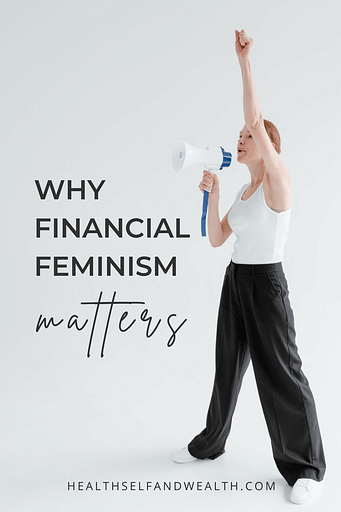
Even in 2022, there’s resistance to the notion of women making financial decisions. I’ll never forget the day when I was in an ethics class 2 years ago in 2020. A gen-z peer volunteered his belief that women didn’t belong in the workplace. They belonged at home.
I was shocked someone in this generation had such traditional and misogynistic beliefs. And he had the audacity to share it out loud in a room half filled with women. He’s not the only person who thinks like that, just one who was willing to vocalize it.
That belief matters because a capitalist society is driven by money. Those with money have control and power. Those without it, don’t. A woman who understands money is harder for others to control.
The very act of managing your money is feminist. It gives you control over your own life. That’s the power of financial feminism.
You are the main character of your own story. And with any pursuit, there will be obstacles for you to overcome and reach your goals.
Our society’s foundation is built upon traditional, outdated beliefs about a woman’s role in society. Those systemic biases present obstacles in a woman’s path to wealth.
Let’s address those obstacles, followed by actionable tips to help you overcome them at an individual level.
This is financial feminism and how you can own your power.
A woman’s role in society
What is the first thing that pops into your mind when you hear these words?
- Kind
- Breadwinner
- Ambitious
- Assertive
- Confident
- Homemaker
- Direct/blunt
Particularly think of your first image of a breadwinner and homemaker. Society trains us to think about gender and roles in a certain way. Even as I’m writing this trying to illustrate this point, when I hear breadwinner, I picture a male. When I first envision a homemaker, I see a woman.
Can you relate? If so, this instinct comes from societal influences. The culture of our society reinforces gender stereotypes. Think back to a time when you did something that didn’t align with someone else’s stereotype of you. How did they react when you defied their beliefs about you?
People like predictability and consistency. In my personal experiences, my defiance of stereotypes has resulted in a wide range of reactions from positive admiration to negative backlash.
I like to tell myself I don’t care what people think of me, even though that’s not entirely true yet. If you have a desire to be liked by others, that desire actually stems from a survival instinct.
In a “herd” life, you must have acceptance and support of the group to avoid being outcast. Survival would depend on it because it would be difficult to survive on your own without the herd.
While a woman, or anyone, can fill any role in society they would like to, defying society’s expectations can have consequences. Despite that, you don’t need anyone else to give you permission to live the life you want.
In the past, I would flex into the person I thought others wanted me to be. I had to unlearn that (and I still am unlearning that). I only have one life, and I refuse to feel guilty for living it the way I want to.
Financial feminism provides the power to live your best life regardless of societal expectations.
Systemic biases
In particular, a “woman’s role” comes into play in the workplace, which also connects to systemic biases. Financial feminism attempts to address these issues that slow down a woman’s progress towards achieving financial stability.
In general, assertive women in the workplace may be perceived as bossy. In general, when men are assertive they are perceived as confident, competent, etc.
This is just one general example of a stereotypical gender perception. This pressure to fit into a gender role or be “outcast” makes it difficult to grow in a career.
Especially since being assertive can be perceived as defying a woman’s gender role. BUT the flip side is assertiveness is often needed to get promoted!
It’s a difficult balancing act where it’s impossible to please everyone.
The gender roles are somewhat “invisible” aspects of systemic biases. People may not even be aware of the biases they have. In other words, someone may not even realize why an assertive woman irritates them. This invisibility makes the biases difficult to identify and measure.
Since this interpersonal aspect cannot be directly measured, let’s look at compensation differences between women and men.
Impact of the Wage Gap
On average, women earn 82 cents for every $1 men make. While this wage gap information is fairly well-known, it’s hard to grasp the true impact that has on a woman’s finances over her lifetime.
To explore this, I analyzed different scenarios to model the impact of the wage gap. For context, I looked at four salaries: $25K, $50K, $75K, and $100K. To account for the wage gap, I adjusted those salaries down to 82% for women, detailed below.
| Men | Women |
| $25,000 | $20,500 |
| $50,000 | $41,000 |
| $75,000 | $61,500 |
| $100,000 | $82,000 |
For the sake of this exercise, let’s assume women and men start their careers at one of these salaries. The average raise is about 3%. The table below shows how much the average man would out earn the average woman at various timepoints in their careers.
| Male starting salary | $25K | $50K | $75K | $100K |
| Female starting salary | $20.5K | $41K | $61.5 | $82K |
| 10 Years | $53K | $106K | $159K | $213K |
| 20 Years | $125K | $249K | $374K | $498K |
| 30 Years | $221K | $441K | $662K | $882K |
| 40 Years | $349K | $697K | $1,049K | $1,398K |
For example, a woman with a starting salary of $41K, loses out on almost $700K by the end of her 40 year career.
There are flaws with this model.
- Typically men and women start out with more equal salaries, and the gap widens over time.
- This model doesn’t take account for having children, which typically causes a woman’s career trajectory to flatline and improves a man’s.
- It doesn’t consider the opportunity cost of earning less money, which would be having less money to invest. Investing builds wealth. The wealth gap between women and men is wider than the wage gap. The average woman typically owns 32 cents for every $1 a man owns.
Overall, the wage gap provides insight into the systemic biases still present in 2022. This obstacle makes it more challenging for women to build wealth. Despite this, you and I can focus on the aspects we can control at an individual level.
The power of financial feminism comes from reclaiming power over the aspects within our control.
Overcoming Obstacles
Despite those obstacles, here are 5 steps you can take now to look out for your financial well-being:
- Talk about money.
- Understand the value you bring and how you deserve to be compensated.
- Advocate for yourself, with compensation, work/life balance, promotions, etc.
- Make sure you understand your financial situation.
- Plan for the financial future you want.
Talk about Money
In the past, talking about money was taboo. Now it’s one of the most important aspects of financial feminism.
When you talk about money, you can share and learn actionable tips to help build your wealth. Your eyes will be opened to what’s possible.
If you don’t have friends/family to talk money with, you can surround yourself with money advocates online.
Understand your value
Do your research to discover the market value of the skills you bring. This is a great way to double check your employer is paying you in line with market value. If not, you can use that knowledge to advocate for appropriate compensation for the value you bring.
If your employer isn’t willing to pay you market rates for your skills, perhaps you want to consider looking for a new job that will.
When you understand your value, you are less likely to let others take advantage of you and underpay you.
Advocate for yourself
This is your life and no one can be a mind reader. If you aren’t getting what you need, advocate for yourself! This goes for a job, a relationship, etc.
Ask for the raise you deserve. Go for the promotion. Request time off. Apply for new opportunities that excite you.
It’s up to you to make sure you’re living the life you want, so advocate for it! Financial feminism is all about having money so you have the power to make choices that improve your life.
Understand your financial situation
Make sure you understand your financial situation. In other words, don’t let a partner have complete control. Ensure you have access to all accounts and understand the implications of all your money decisions.
Also seek your own resources to learn about money instead of solely relying on your partner.
Know how much you spend, how much you earn, how much you invest/pay off debt/save, and your net worth. You can track it in a journal, a spreadsheet, or with an app.
If you want a pre-built spreadsheet where you can plug in your money decisions, you can check out the Personal Finance Planner here.
Plan for your financial future
Money matters to the extent to which it gives you the means to live the life you want. Reflect on what matters to you so you can make money decisions in alignment with your priorities.
Here are 5 free journal prompts to help you reflect on what your best life would look like.
More resources for you
Here are more resources to help you improve your financial well-being. Learning about money and sharing that knowledge with others is a critical aspect of the financial feminism movement.
Conclusion
Financial feminism is a movement to help you have control over your own life. It’s why I’m sharing everything I’m learning about personal finance to help you.
If you liked this, you may also like the Wealthy Women Club. It’s a free, weekly newsletter with tips for helping you build wealth so you have the means to live your best life. If you’re interested, you can check it out here.








